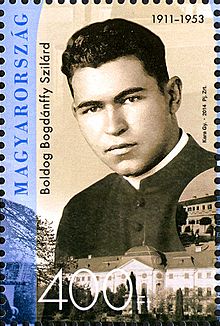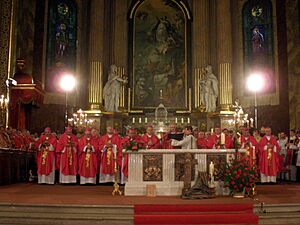Szilárd Bogdánffy facts for kids
Quick facts for kids Blessed Szilárd Bogdánffy |
|
|---|---|
 |
|
| martyr | |
| Born | 21 February 1911 Feketetó, Austria-Hungary |
| Died | 3 October 1953 Aiud, Romania |
| Venerated in | Roman Catholic Church |
| Beatified | 30 October 2010, Oradea, Romania by cardinal Angelo Amato |
| Feast | 3 October |
| Attributes | solideo or bishop's cap and gown, palm |
| Patronage | bishops, priests |
Szilárd Ignác Bogdánffy was an important Catholic leader. He served as an auxiliary bishop, which means he helped the main bishop in the areas of Satu Mare and Oradea. On October 30, 2010, he was declared blessed in a special ceremony in Oradea, Romania. He was recognized as a martyr, someone who died for their faith, during the time of Communism in Romania.
Contents
Early Life and Education
Szilárd Bogdánffy was born on February 21, 1911, in a village called Feketetõ. This village was then part of Austria-Hungary. Today, it is known as Crna Bara in Serbia. He lived there with his family until 1925. He was baptized in the church of Čoka, where his father worked as a cantor (a singer in the church).
School and Becoming a Priest
Szilárd went to elementary school in Crna Bara. In 1925, his family moved to Timişoara, a city in Romania. There, he attended the Piarists high school. After finishing high school, he was accepted into the Catholic seminary in Oradea. A seminary is a special school where people study to become priests.
On June 29, 1934, he became a priest. He continued his studies at the University of Budapest. There, he earned a PhD in philosophy and dogmatics. After his studies, he returned to Romania. He became a professor at the Catholic seminary in Oradea. He also became a confessor at the Ursuline convent, helping people with their spiritual lives.
Facing Challenges
In 1939, Romanian secret services watched him. They thought he might be acting against Romania. During World War II, he helped hide Jewish people. Because of this, he was questioned by Hungarian Fascist police.
Secret Bishop and Imprisonment
After World War II, a new Communist government took power in Romania. This government began to act against Christian religions, especially the Catholic Church. Because of this, the Vatican allowed bishops to be secretly chosen and consecrated.
Becoming a Secret Bishop
Dr. Szilárd Bogdánffy was secretly made a bishop on February 14, 1949. He became the bishop of Oradea and an auxiliary bishop of Satu Mare. This secret ceremony was performed by Gerald Patrick O’Hara, a special representative from the Vatican.
Arrest and Suffering
Just two months after becoming a bishop, Szilárd Bogdánffy was arrested and put in prison. Before his arrest, government officials had asked him to lead a "Romanian Latin-rite Church" that would not be connected to the Vatican. He strongly refused this idea.
He spent four years in different prisons across Romania. One of these was the very harsh Capul-Midia camp. He became very sick because of the terrible conditions and regular torture. In Aiud Prison, another Catholic bishop, Ioan Ploscaru, remembered Bishop Bogdánffy as "humble and serene." He was always ready to help others who were suffering with him.
Even though he had severe pneumonia, the prison doctor refused to give him medicine. The doctor claimed he did not deserve it. Szilárd Bogdánffy died alone in his prison cell on October 3, 1953, in the prison of Aiud, Romania.
Beatification
Szilárd Bogdánffy's beatification ceremony took place on October 30, 2010, in Oradea. Beatification is a step towards becoming a saint in the Catholic Church. A large Mass was held with 200 priests, 42 bishops, and two cardinals. Cardinal Péter Erdő led part of the ceremony. Cardinal Angelo Amato officially presided over the beatification.
Szilárd Bogdánffy was the first Catholic martyr from the Communist time in Romania to be honored in this way.
See also
 In Spanish: Szilárd Bogdánffy para niños
In Spanish: Szilárd Bogdánffy para niños
 | Emma Amos |
 | Edward Mitchell Bannister |
 | Larry D. Alexander |
 | Ernie Barnes |


